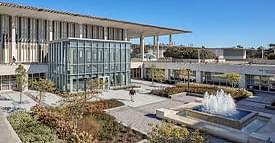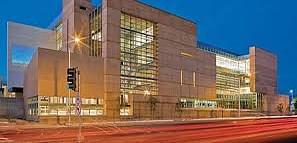Bachelor of Science [B.S] (Electrical Engineering)
Field of Study:
$34,867/Yr
Graduates from our program find employment in the power industry, engineering consulting firms, renewable energy companies, aerospace and communications firms, as well as a wide variety of companies that rely on embedded intelligence to manage data and systems. Another popular choice of our students after graduation is graduate school, where an advanced degree will open up opportunities in corporate and government research labs or academia, and the opportunity to become technological leaders.
Students in the Electrical Engineering program complete a set of core courses that include mathematics, basic sciences, and engineering sciences during their first two years. Course work in mathematics is an essential part of the curriculum, which gives engineering students essential tools for modeling, analyzing, and predicting physical phenomena. The basic sciences are represented by physics and chemistry, which provide an appropriate foundation in the physical sciences. Engineering sciences build upon the basic sciences and are focused on applications.
The first two years also includes Engineering design course work within the Engineering Practice Introductory Course (EPICS I). This experience teaches design methodology and stresses the creative and synthesis aspects of the engineering profession. Finally, the first two years includes systems-oriented courses with humanities and social sciences content; these courses explore the linkages within the environment, human society, and engineered devices.
In the final two years, students complete an advanced core that includes circuit analysis, electronics, electromagnetic fields and waves, and digital systems. Because of our program focus, the core curriculum also includes courses in signal processing, embedded microprocessor systems design, machines and power systems, and control systems. Students can also take specialized electives that further develop their expertise in one of these focus areas, or in other areas such as robotics, biomedical engineering, and computing.
In their final year, students complete a capstone design course that is focused on an in-depth engineering project. The projects are generated by customer demand, and include experiential verification to ensure a realistic design experience.

1546425900.png?h=48&w=101&mode=stretch)
Do you think the Rankings are wrong ? Report Here
TOP Scholarships
| Scholarship name | Award amount | Eligibility |
|---|---|---|
| - | - | - |
| - | - | - |
| - | - | - |
Key Resources for Your Study Abroad Journey
Scholarship Grants & Financial Aids
| Name | Scholarship Per Student | Level of Study | Type | |
|---|---|---|---|---|
| ASID Foundation Legacy Scholarships | Scholarship per student$ 4,000/Yr$4,000 | Level Of StudyBachelor | TypeMerit-Based | |
| Innovation in Education Scholarship - La Tutors 123 | Scholarship per student$ 500/Yr$500 | Level Of StudyBachelor | TypeMerit-Based | |
| (ISC)² Women’s Cybersecurity Scholarships | Scholarship per studentVariable Amount | Level Of StudyBachelor | TypeMerit-Based | |
| R&D Systems Scholarship | Scholarship per student$ 1,500/Yr$1,500 | Level Of StudyBachelor | TypeMerit-Based | |
| Collegedunia $150 Scholarship Program | Scholarship per student$ 150/Yr$150 | Level Of StudyBachelor | TypeMerit-Based | |
| Go Clean Scholarship | Scholarship per student$ 3,500/Yr$3,500 | Level Of StudyBachelor | TypeMerit-Based |
Similar Colleges


University at Albany


Northern State University


Abilene Christian University
.jpeg?h=143&mode=stretch)

Ohio Northern University


University of South Carolina


University of Akron


State University of New York Polytechnic Institute


University of New Mexico




























Comments